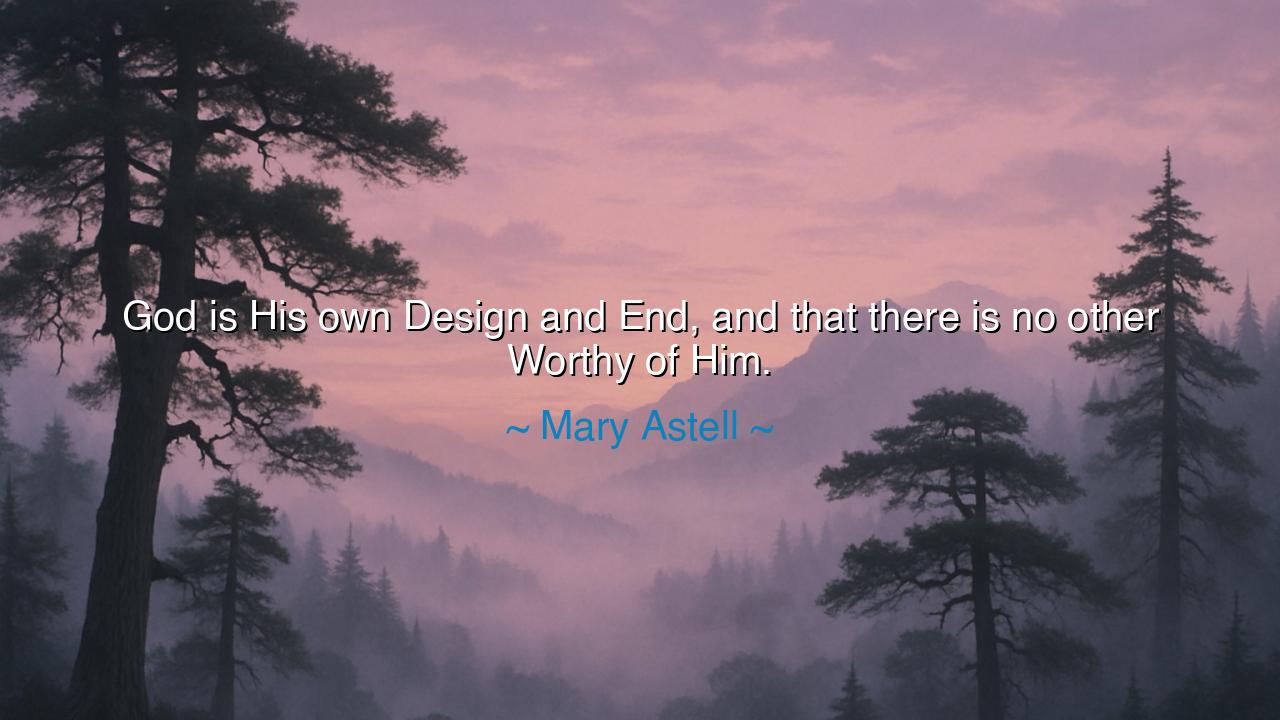
God is His own Design and End, and that there is no other Worthy






In the words of Mary Astell, the philosopher often called the first English feminist, there shines a truth as radiant as the morning star: “God is His own Design and End, and that there is no other Worthy of Him.” These words rise not merely from the intellect, but from the soul’s deepest contemplation. In them, Astell speaks of the eternal perfection of the Divine — that God, the source of all creation, seeks nothing beyond Himself, for nothing beyond Him is greater, purer, or more complete. To the mortal ear, this may sound like mystery, but to the heart that yearns for wisdom, it is revelation.
In the age when Astell wrote — the late seventeenth century — the world was awakening to new philosophies. Men debated the laws of nature, the motion of stars, and the rights of reason. Yet Astell, standing firm as a woman of spirit and intellect, turned her gaze not merely toward the heavens above, but inward — toward the design of the soul. She saw that in all of nature, every creature moves toward its purpose: the seed toward the tree, the river toward the sea, the human toward understanding. But God, being perfect, moves toward no end but Himself. For He is both the Design — the architect of all things — and the End — the fulfillment of all existence. To seek something higher than Himself would be to admit imperfection; thus, in His completeness, He is the measure of all worthiness.
There is a stillness in this truth, like the calm at the center of the universe. Astell invites us to see that if the Creator’s end is Himself — infinite, good, and eternal — then so too should the soul that bears His image turn inward toward that divine center. Humanity, she reminds us, is restless not because the world is empty, but because it seeks its rest in things unworthy of its origin. We chase wealth, glory, and love, yet these are but shadows cast by the true Light. When the heart anchors itself in God — when it seeks, as He does, no lesser end — then it becomes whole.
Consider the story of Saint Teresa of Ávila, who in her youth sought joy in friendship and admiration, but found them fleeting. Only when she turned inward, seeking union with the Divine, did she discover peace. She wrote of the soul as a castle, with many rooms — but at the center, the chamber of light where God Himself dwells. Astell’s vision echoes this: the greatest design of the soul is not conquest or fame, but reflection of divine order — to live so purely, so purposefully, that one’s being becomes a mirror of God’s own intention.
In a time when women were told their purpose was to serve man, Astell dared to speak of a higher allegiance — not rebellion, but transcendence. She argued that a woman’s mind was as capable of seeking truth, of aligning with the divine design, as any man’s. Her words were a sword of reason forged in faith. To her, to live rightly was to live toward the same end as God — not for worldly approval, but for eternal harmony. She taught that when the soul imitates God’s purpose — self-contained, self-directed, devoted to goodness for its own sake — it rises above all limitation.
And so, the lesson endures: to live with divine intention is to live with peace. Do not seek your worth in the gaze of others; do not measure your success by fleeting rewards. Instead, turn your life into a reflection of your highest design. Work with excellence not for praise, but because excellence itself is sacred. Love without possession, give without seeking return, and think not of what others will remember — for the true reward is in the act that aligns with truth itself.
Know this, seeker of wisdom: the soul’s noblest task is not to build a monument, but to build an inner temple. When your heart, your thought, and your action flow in harmony with divine purpose, then you have joined the eternal rhythm of creation. Like God, you will need no validation from the world, for the world will recognize in you a reflection of its Source.
Therefore, remember Mary Astell’s sacred wisdom — that the greatest being needs no other end, and neither do you, when you walk in truth. Seek not to please the passing, but to serve the eternal. For when your design and your end become one, when your work is its own worth, you will have touched, if only for a moment, the perfection she saw — the perfection of God Himself.






AAdministratorAdministrator
Welcome, honored guests. Please leave a comment, we will respond soon